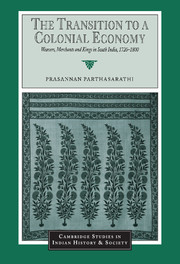Book contents
- Frontmatter
- Contents
- List of tables
- Acknowledgments
- Note on Indian words and place names
- Note on money
- List of abbreviations
- Introduction
- 1 Weavers and merchants 1720–1760
- 2 Agriculture and cotton textiles
- 3 Weaver distress 1765–1800
- 4 Weaver protest
- 5 Laborers, kings and colonialism
- Glossary
- Bibliography
- Index
- Titles in the series
4 - Weaver protest
Published online by Cambridge University Press: 05 July 2009
- Frontmatter
- Contents
- List of tables
- Acknowledgments
- Note on Indian words and place names
- Note on money
- List of abbreviations
- Introduction
- 1 Weavers and merchants 1720–1760
- 2 Agriculture and cotton textiles
- 3 Weaver distress 1765–1800
- 4 Weaver protest
- 5 Laborers, kings and colonialism
- Glossary
- Bibliography
- Index
- Titles in the series
Summary
Weavers hotly contested the Company's attempts to regulate the cloth market, transform the customs of contract and control the cloth production process. They orchestrated work stoppages, desertions and even riots in order to derail the Company's schemes. Many of these actions were local affairs in which a few dozen weavers participated, but there were also large-scale protests that drew upon several hundred weavers from a score or more towns and villages. In 1768, for example, weavers in the Northern Sarkars declared a work stoppage in which 900 participated. Merchants touring the area “found every loom tied up … and were told they would find it the same at every town.” In 1775, again in the Sarkars, weavers organized a work stoppage which was comparable in size and scope and sustained it for nearly four months. In 1778 Cuddalore weavers mobilized more than a thousand of their number and paralyzed the Company's investment for seven months. In 1798 300 weavers in Madapollam abandoned their looms in protest of their deteriorating conditions. They roamed the countryside, recruited 200 more to their cause, and disrupted yarn markets and cloth deliveries to the Company. Eventually the weavers assembled at the Madapollam factory where they demanded higher prices for their cloth.
Despite the number and scale of these protests they have received little scholarly attention. Indeed, very little is known about the nature and forms of resistance or protest in eighteenth-century South India, or South Asia for that matter.
- Type
- Chapter
- Information
- The Transition to a Colonial EconomyWeavers, Merchants and Kings in South India, 1720–1800, pp. 101 - 120Publisher: Cambridge University PressPrint publication year: 2001

